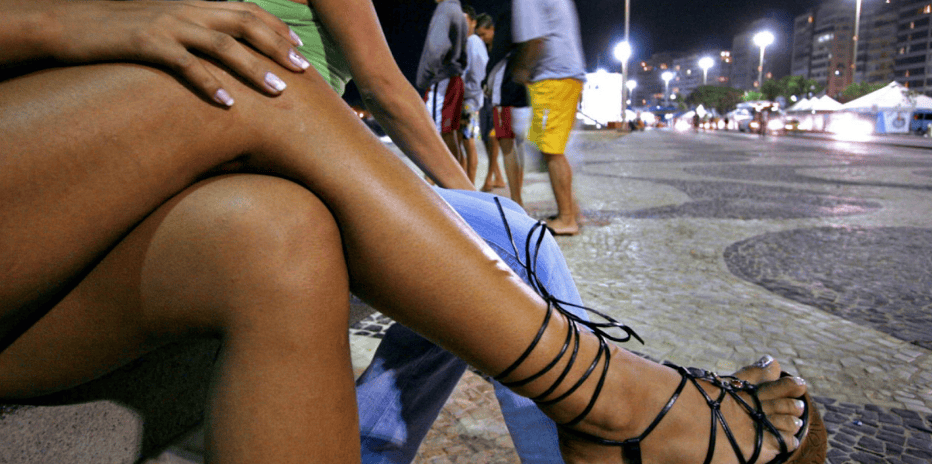In Accra, Ghana’s capital, 29-year-old Ama Oforiwaa said she found herself turning to sex work after being laid off from her previous job as a cleaner.
“It was a difficult decision, but I needed to pay the bills and take care of myself,” she said. “While I’ve had some positive experiences with respectful clients, I’ve also endured traumatizing incidents like physical and verbal attacks.”
For people like Oforiwaa, sex work becomes a necessary means of survival, albeit one fraught with risks.
A study conducted in January 2023 and published in the Proceedings of the National Academy of Sciences found that there are approximately 2.5 million female sex workers aged 15 to 49 in sub-Saharan Africa.
Although commercial sex work is illegal in Ghana, it is a thriving business.
Sex work remains a controversial topic globally, with many countries struggling to regulate the industry.
In Africa, social, cultural, and economic factors contribute to the complexity surrounding sex work, making it extremely hard for sex workers to access basic rights and services.
Abigail Kumi, a 30-year-old sex worker in Accra, said she also turned to sex work out of desperation when she lost her housing and struggled to find other employment.
“I never envisioned myself in this line of work, but options were limited,” she said. “It has been a challenging journey.”
Sex workers in Africa face significant hurdles, including violence, exploitation, and trafficking, said Meimunatu Issah, a gender advocate based in Accra.
“Despite the legality of sex work in some African countries, it remains dangerous,” she said.
In many countries, sex work is criminalized or stigmatized, rendering it difficult for sex workers to access essential services such as healthcare and insurance.
Consequently, they endure discrimination and harassment from law enforcement officials, healthcare providers, and society at large.
Research indicates that HIV prevalence among sex workers is significantly higher than in the general population. Evidence shows that HIV prevalence among sex workers can be as much as 12 times greater than among non-sex workers.
Even in countries with high overall HIV prevalence rates, the prevalence among sex workers remains disproportionately higher.
For instance, an analysis of 16 countries in sub-Saharan Africa conducted revealed a pooled HIV prevalence of over 37% among sex workers. The elevated risk of HIV among sex workers is attributed to various factors, including stigma, discrimination, violence, and punitive legal and social environments.
Punitive environments have been found to hinder access to HIV prevention, treatment, care, and support for both sex workers and their clients. These factors collectively contribute to the increased vulnerability of sex workers to HIV/AIDS.
Despite her five years in the industry, Oforiwaa has never had any form of insurance coverage, leaving her vulnerable to unforeseen accidents and emergencies.
“I’ve dealt with violent clients who refused to pay, and I had no legal protection or support to seek justice,” she said. “Concerns about my health, particularly the risk of STIs, constantly weigh on my mind.”
Kumi, a relative newcomer to the industry, echoed these concerns. “I’ve had frightening encounters with aggressive and threatening clients, knowing that I lack financial or legal support if something were to happen,” she said.
Insurance experts agree that tailored policies for sex workers are crucial in providing them with necessary protection.
“Many assume that sex work’s legality means insurance companies won’t cater to these workers,” explained Mensah Osei, an insurance specialist in Accra. “However, this assumption is not entirely accurate.
There are policies available that can cover legal expenses, loss of income, and personal injury.”
Smith Koomson, an insurance consultant, added that insurance for sex workers extends beyond individual protection—it benefits society as a whole.
“By providing sex workers with insurance, we ensure they receive proper medical care, reduce the spread of STIs, and collaborate with non-g law enforcement agencies to combat human trafficking. Insurance also offers income protection, empowerment through training, and supports advocacy efforts for better working conditions and rights protection ,” he said.
Koomson said by investing in prevention and support, insurance companies can actively safeguard vulnerable populations.
Insurance specialist Osei stressed the importance of raising awareness about insurance needs for sex workers and working towards tailored policies and regulations that support this vulnerable population.
“This includes working with insurance providers to develop policies meeting their specific requirements, while advocating for legal and social reforms that reduce stigma and improve their rights and protections,” he explained.
In 2015, the International Finance Corporation (IFC) made a projection that the insurance industry would generate a substantial $1.7 trillion by 2030 solely from the participation of women.
However, women often encounter formidable cultural barriers, hindering their access to insurance outlets dominated by men. Similarly, the gender disparity persists in financial realms, as women have a tougher time securing credit for their enterprises compared to men.
Moreover, this gender gap extends into the digital sphere. Women encounter reduced access to mobile phones and the internet, thereby limiting their ability to tap into digitally delivered insurance solutions.
This not only reinforces the existing disparities but also impedes their participation in the potential financial growth foreseen by the IFC.
Recognizing the low levels of insurance penetration in Ghana, with
70% of Ghanaians having no access to insurance, Commissioner of Insurance at the National Insurance Commission (NIC), Prof. Justice Ofori, expressed concern.
He highlighted the NIC’s commitment to making insurance more accessible and affordable for all Ghanaians, emphasizing its role in protecting families, vulnerable populations, and businesses from financial risks.
“Insurance is an essential tool, and we want to ensure that everyone has access to this important form of protection,” he said.
According to the National Insurance Commission, the strategy is to grow the industry from 2% to 10% of GDP by 2023.
Prof. Justice Ofori outlined the NIC’s initiatives to increase insurance uptick and cater to the diverse needs of Ghanaians. This includes developing products specifically tailored to different groups, such as farmers, small business owners, and vulnerable populations.
The primary objective is to support the Sustainable Development Goals and align with the vision of the InsuResilience Global Partnership for the year 2025. This partnership aims to enhance the resilience of developing nations and safeguard the well-being and livelihoods of impoverished and susceptible populations from the adverse effects of disasters and climate-related risks.
“We must continue to fight for the rights and protections of all sex workers, recognizing their inherent dignity and worth as human beings,” said the gender advocate Meimunatu Issah.
“By doing so, we can create a more just and equitable society for everyone through inclusive insurance policies where everyone has the opportunity to thrive and live a life of dignity, respect and security.”
Source: Ghana/Starrfm.com.gh/103.5FM/Ridwan Karim Dini-Osman




